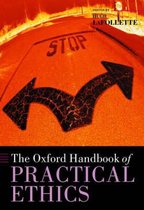Oxford Handbooks-The Oxford Handbook of the Epistemology of Theology
Afbeeldingen
Sla de afbeeldingen overArtikel vergelijken
Uitgever: Oxford University Press
- Engels
- Paperback
- 9780198816621
- 09 november 2021
- 656 pagina's
Oxford University Press
Oxford University Press had its origins in the information technology revolution of the late fifteenth century, which began with the invention of printing from movable type. The first book was printed in Oxford in 1478, only two years after Caxton set up the first printing press in England.
Despite this early start, the printing industry in Oxford developed in a somewhat haphazard fashion over the next century. It consisted of a number of short-lived private businesses, some patronized by the University. But in 1586 the University itself obtained a decree from the Star Chamber confirming its privilege to print books. This was further enhanced in the Great Charter secured by Archbishop Laud from King Charles I, which entitled the University to print 'all manner of books'.
The University established its right to print the King James Authorized Version of the Bible in the seventeenth century. This Bible Privilege formed the basis of a profitable business throughout the next two centuries and was the spur to OUP's expansion. A Bible warehouse was set up in London, which later grew into a major publisher of books with educational or cultural content aimed at the general reader. OUP then began to expand internationally, starting with the opening of an American office in 1896.
Oxford's traditions of religious and academic publication were followed in New York. The first book published by the American office was the Scofield Reference Bible in 1909. After it came The Life of Sir William Osler, which won the Pulitzer Prize in 1926. Six more Pulitzers, several National Book Awards, and over a dozen Bancroft Prizes in American history have followed since.
Since 1896, the business has changed considerably, with the growth and evolution of schools' publishing, particularly in the Branches; the introduction of English Language Teaching, Music, Journals, and Trade and General publishing; and the use of new technologies.
Samenvatting
This handbook considers the epistemology of theology, featuring 41 chapters on theology relative epistemic concepts and general epistemic concepts as related to theology, and on studies of individual theologians from St Paul through to Hans Urs von Balthasar and of contemporary movements such as liberation theology and feminism.
The Oxford Handbook of the Epistemology of Theology brings together leading scholars in the fields of theology and epistemology to examine and articulate what can be categorized as appropriate epistemic evaluation in theology. Part one focuses on some of the epistemic concepts that have been traditionally employed in theology such as knowledge of God, revelation and scripture, reason and faith, experience, and tradition. This section also considers concepts that have not received sufficient epistemological attention in theology, such as saints, authority, ecclesial practices, spiritual formation, and discernment. Part two concentrates on epistemic concepts that have received significant attention in contemporary epistemology and can be related to theology such as understanding, wisdom, testimony, virtue, evidence, foundationalism, realism/antirealism, scepticism, and disagreement. Part three offers examples from key figures in the Christian tradition and investigates the relevant epistemological issues and insights in these writers, as well as recognizing the challenges of connecting insights from contemporary epistemology with the subject of theology proper, namely, God. Part four centres on five emerging areas that warrant further epistemological consideration: liberation theology, continental philosophy, modern orthodox writers, feminism, and Pentecostalism. This authoritative collection explores how the various topics, figures, and emerging conversations can be reconceived and addressed in light of recent developments in epistemology. Each chapter provides an analysis of the crucial moves, positions, and debates, while also identifying relevant epistemic considerations. This handbook fulfils the need for the development of this new conversation that will take its natural place in the intersection of theology and epistemology. It links the fields of theology and epistemology in robust, meaningful, and significant ways.
The Oxford Handbook of the Epistemology of Theology brings together leading scholars in the fields of theology and epistemology to examine and articulate what can be categorized as appropriate epistemic evaluation in theology. Part one focuses on some of the epistemic concepts that have been traditionally employed in theology such as knowledge of God, revelation and scripture, reason and faith, experience, and tradition. This section also considers concepts that have not received sufficient epistemological attention in theology, such as saints, authority, ecclesial practices, spiritual formation, and discernment. Part two concentrates on epistemic concepts that have received significant attention in contemporary epistemology and can be related to theology such as understanding, wisdom, testimony, virtue, evidence, foundationalism, realism/antirealism, scepticism, and disagreement. Part three offers examples from key figures in the Christian tradition and investigates the relevant epistemological issues and insights in these writers, as well as recognizing the challenges of connecting insights from contemporary epistemology with the subject of theology proper, namely, God. Part four centres on five emerging areas that warrant further epistemological consideration: liberation theology, continental philosophy, modern orthodox writers, feminism, and Pentecostalism. This authoritative collection explores how the various topics, figures, and emerging conversations can be reconceived and addressed in light of recent developments in epistemology. Each chapter provides an analysis of the crucial moves, positions, and debates, while also identifying relevant epistemic considerations. This handbook fulfils the need for the development of this new conversation that will take its natural place in the intersection of theology and epistemology. It links the fields of theology and epistemology in robust, meaningful, and significant ways.
Productspecificaties
Wij vonden geen specificaties voor jouw zoekopdracht '{SEARCH}'.
Inhoud
- Taal
- en
- Bindwijze
- Paperback
- Oorspronkelijke releasedatum
- 09 november 2021
- Aantal pagina's
- 656
Betrokkenen
- Hoofdredacteur
- William J. Abraham
- Hoofduitgeverij
- Oxford University Press
Overige kenmerken
- Product breedte
- 173 mm
- Product hoogte
- 34 mm
- Product lengte
- 247 mm
- Studieboek
- Nee
- Verpakking breedte
- 173 mm
- Verpakking hoogte
- 34 mm
- Verpakking lengte
- 247 mm
- Verpakkingsgewicht
- 1 g
EAN
- EAN
- 9780198816621
Je vindt dit artikel in
- Categorieën
- Taal
- Engels
- Beschikbaarheid
- Leverbaar
- Boek, ebook of luisterboek?
- Boek
- Studieboek of algemeen
- Algemene boeken
Kies gewenste uitvoering
Bindwijze
: Paperback
Prijsinformatie en bestellen
De prijs van dit product is 74 euro en 99 cent.
2 - 3 weken
Verkoop door bol
- Prijs inclusief verzendkosten, verstuurd door bol
- Ophalen bij een bol afhaalpunt mogelijk
- 30 dagen bedenktijd en gratis retourneren
- Dag en nacht klantenservice
Rapporteer dit artikel
Je wilt melding doen van illegale inhoud over dit artikel:
- Ik wil melding doen als klant
- Ik wil melding doen als autoriteit of trusted flagger
- Ik wil melding doen als partner
- Ik wil melding doen als merkhouder
Geen klant, autoriteit, trusted flagger, merkhouder of partner? Gebruik dan onderstaande link om melding te doen.









